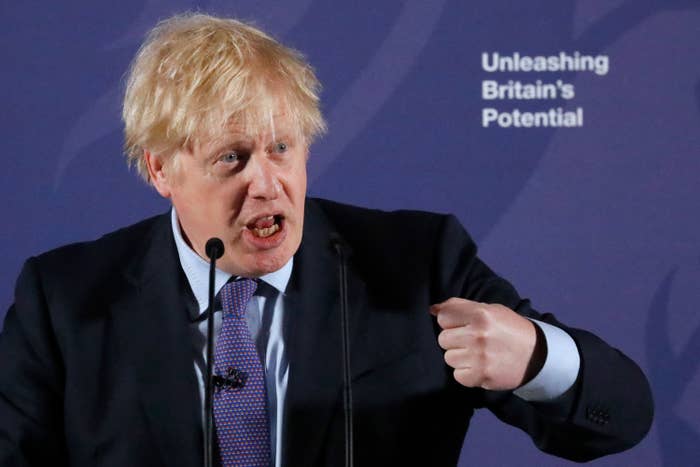
The government has announced emergency legislation to end the automatic early release from prison of terror offenders in the wake of an attack over the weekend.
Prime minister Boris Johnson had earlier said "it's time to take action" after a terrorist who had recently been released from jail attacked people in the south London suburb of Streatham before being shot dead by police.
The justice secretary, Robert Buckland, told the House of Commons that the change would apply to both current and future offenders, because, he said, the UK faced "an unprecedented situation of severe gravity".
The move was swiftly described by the campaigning group Liberty as "a cause for concern" over what could happen to civil rights.
Sudesh Amman, 20, was found with a device strapped to his body that police later identified as a hoax bomb. He was pronounced dead around 2pm local time after the incident in the busy shopping street of Streatham High Road, police said.
Three people were treated at the scene and taken to hospital. Their injuries are not thought to be life-threatening.
Amman was under active police surveillance at the time of the attack, which police believe to be a terrorism-related incident. He had been released from prison after serving half of his sentence of more than three years for the possession and distribution of extremist material.

Following a speech on global trade in Greenwich, east London, today, Johnson said: "I think the question that everybody has about the individual concerned is what was he doing out on automatic early release and why was there no system of scrutiny, no parole system, to check whether he was really a suitable candidate for automatic early release," going on to add that it was a "complex legal question".
He went on to say the government was bringing forward legislation to stop the system of automatic early release, set to be announced by Buckland — but, he went on: "the difficulty is how to apply that...retrospectively to the cohort who currently qualify."
Speaking on BBC Newsnight, the former reviewer of terror legislation, Lord Carlile, said the government's emergency legislation "may be in breach of the law."
"It's certainly going to be challenged and I'm not satisfied that the government has faced up to the legal challenge fully," he said on the programme.
He added: "Lengthening the sentence doesn't solve the problem because those individuals are still going to have to come out of prison at some point."
The circumstances surrounding the attack echo that of another former terrorist prisoner, Usman Khan, who stabbed and killed two people in London Bridge in late November. Questions are now being raised over how Amman was able to carry out the attack so soon after his release.
The prime minister said there were questions about how to detain the country's 200 or so terror suspects: "Do you detain them in one group and try and keep them together because that avoids them passing the virus of their beliefs onto others?
"Or do you disperse them and try and stop them reinfecting each other? And that's a very important problem."
He said the rehabilitation of terror suspects "can happen but the instances of success are very few and to be frank we need to think about how we handle that in our criminal justice system".
Buckland will make a statement to MPs later on Monday setting out more detail.
Streatham MP Bell Ribeiro-Addy said: “He [Amman] was under surveillance quite soon after being released which begs the question, why was he released so soon?”
"It's very important that we don't let fear and divisions win, because that's when the terrorists win." Streatham MP @BellRibeiroAddy questions whether it was "necessary" for the attacker to be released early from prison. #KayBurley More on the attack: https://t.co/HYUZdWbO5l
Treasury minister Rishi Sunak said: “The police are obviously doing absolutely everything they can to keep people safe” and added new measures to toughen terrorism laws would give police “more powers and resources to do that as well.”
After an emergency meeting with home secretary Priti Patel on Sunday, prime minister Boris Johnson said: "[On Monday] we will announce further plans for fundamental changes to the system for dealing with those convicted of terrorism offences.”
Thank you to all emergency services responding to the incident in Streatham, which the police have now declared as terrorism-related. My thoughts are with the injured and all those affected.
Amman was first arrested when he was 18 in May 2018, on suspicion of planning a terrorist attack. He was later charged over his ownership and distribution of terrorist propaganda.
Detectives discovered that Amman had shared al-Qaeda content in a family WhatsApp group and pronounced the “Islamic State is here to stay.”
He sent videos of beheadings to his girlfriend and told her: “If you can’t make a bomb because family, friends or spies are watching or suspecting you, take a knife, molotov, sound bombs or a car at night and attack the tourists (crusaders), police and soldiers of taghut [false gods], or Western embassies in every country you are in this planet.”
Large police presence in #Streatham - air ambulance, police heli. Unconfirmed reports of shooting on High Road.
At the time of his conviction, acting Cmdr. Alex Boon, then head of the Met Police counterterrorism command, said Amman had a “fierce interest in violence and martyrdom.”
“His fascination with dying in the name of terrorism was clear in a notepad we recovered from his home,” said Boon in 2018. “Amman had scrawled his ‘life goals’ in the notepad and top of the list, above family activities, was dying a martyr and going to ‘Jannah’ — the afterlife.
“It’s not clear how Amman became radicalised but it is apparent from his messages that it had been at least a year in development. Whatever the circumstances, this case is a reminder of the need to be vigilant to signs of radicalisation and report it.”
Speaking to Sky News, Amman's mother Haleema Faraz Khan said she had visited her son at a bail hostel on Thursday and spoke to him on the phone hours before the attack took place.
She added that he was a "nice polite boy" who wanted to study biomedical science but became radicalised after watching Islamist material online.
Police are continuing with their investigation into the incident, with Scotland Yard saying officers are searching residential addresses in south London and Bishop’s Stortford, Hertfordshire.
“No arrests have been made and inquiries continue at pace,” the Met Police said.
